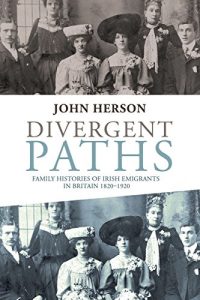This book is unique in adopting a family history approach to Irish immigrants in nineteenth century Britain. Historians of the Irish in Britain have almost totally ignored the family dimension, but this study shows that the family was central to Irish peoples' lives and experiences. It was the major factor influencing the life choices and identities of the migrants and their descendants. The book documents for the first time a representative sample of Irish immigrant families and uses the techniques of family and digital history to explore their long-term fate. To do this it examines the Irish in Stafford in the West Midlands, a town that was a microcosm of the broader Irish experience in England.
Central to the book is a unique body of evidence about the lives of ordinary families. They were united by their Irish origins and by living in the same town, but there the similarity ended. In the long term they diverged in different directions. Many families integrated into the local population, but others ultimately moved away whilst some simply died out. The case studies explore the reasons why the fate of these families proved to be so varied.
The book reveals a fascinating picture of family life and gender relations in nineteenth-century England. It will appeal to scholars of Irish history but also to people interested in social history, genealogy and the history of the family. It also offers valuable historical parallels to the lives of contemporary immigrant families in Britain.
Central to the book is a unique body of evidence about the lives of ordinary families. They were united by their Irish origins and by living in the same town, but there the similarity ended. In the long term they diverged in different directions. Many families integrated into the local population, but others ultimately moved away whilst some simply died out. The case studies explore the reasons why the fate of these families proved to be so varied.
The book reveals a fascinating picture of family life and gender relations in nineteenth-century England. It will appeal to scholars of Irish history but also to people interested in social history, genealogy and the history of the family. It also offers valuable historical parallels to the lives of contemporary immigrant families in Britain.






